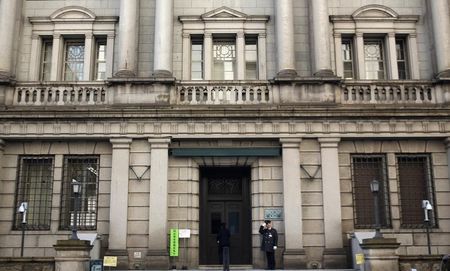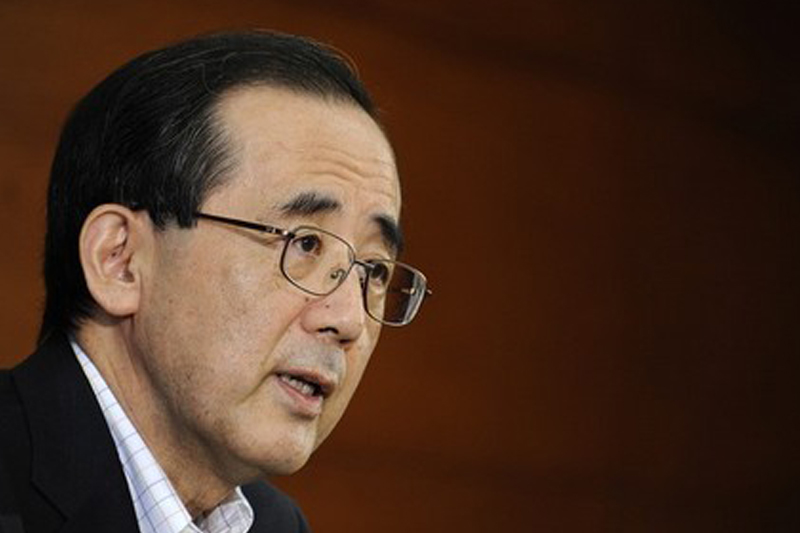By Leika Kihara
TOKYO (Reuters) - The Bank of Japan maintained its massive monetary stimulus and its upbeat view on the economy on Thursday, unfazed by recent signs the pain from an April sales tax rise may last longer than expected and make its inflation target harder to achieve.
But the central bank cut its assessment on housing investment and warned that factory output remained weak, a nod to pessimists on its board who fret that a rebound in the economy after a severe second-quarter contraction may be quite modest.
"Japan's economy continues to recover moderately as a trend," although the effects of the sales tax hike in April are lingering, the central bank said in a statement issued after its policy meeting, sticking with its assessment from last month.
Private consumption is firm as the effect of the sales tax increase to 8 percent from 5 percent is easing, although housing investment continues to feel the pinch from the higher tax, the BOJ said. In August, it said the impact on both housing investment and consumption was waning.
A recent run of weak data, including a slump in household spending and tepid factory output growth in July, has cast doubt on the BOJ's view that the economy will pick up steadily.
But the central bank maintained its projection that the economy will continue to recover moderately, with consumption set to benefit from a tightening job market, which is pushing up wages.
The BOJ's optimism contrasts with growing doubts among private-sector analysts that the economy can grow strongly enough to see consumer price inflation - now around 1.3 percent - accelerate towards the central bank's 2 percent target.
As widely expected, the central bank left unchanged its policy framework, under which it has pledged to increase base money by 60-70 trillion yen ($571-$666 billion) per year via aggressive asset purchases to reflate the long-moribund economy.
"The BOJ is saying that right now parts of the economy are weaker than expected, but it still expects growth to accelerate in the future," said Hiroshi Miyazaki, senior economist at Mitsubishi UFJ Morgan Stanley Securities.
"It is possible the BOJ will downgrade this fiscal year's GDP forecasts, but as long as it expects healthy growth for next fiscal year, I see no change to its policy stance."
Markets are focusing on BOJ Governor Haruhiko Kuroda's take on the recent batch of weak data and the outlook for the economy at his post-meeting news conference.
Offering some relief to policymakers, Japan's Nikkei stock average hovered around a seven-month high on Thursday on hopes that Wednesday's cabinet reshuffle by Prime Minister Shinzo Abe would give fresh momentum to his growth-oriented policies.
Abe told reporters after the reshuffle that pulling Japan out of chronic deflation remained his top priority and that a decision on whether to proceed with a second increase in the sales tax next year depended largely on data in coming months.
WAGE SIGNALS
Japan's economy shrank by an annualised 6.8 percent in the second quarter, more than erasing a first-quarter surge in the run-up to the sales tax increase. Analysts polled by Reuters expected a 3.8 percent bounce this quarter.
The BOJ is likely to cut its economic growth projection for the current fiscal year when it reviews its long-term forecasts in October. But it still expects the economy to ride out the tax rise and recover enough to meet its 2 percent inflation target sometime in the next fiscal year starting in April.
Kuroda has stressed that the recovery remains on track and that Japan is making headway in meeting the price target.
Sources have told Reuters that the BOJ is likely to keep its bullish price forecasts even if it cuts its economic growth forecast in October.
Behind the BOJ's optimism is a steady improvement in the labour market and income conditions. The jobless rate is at levels the BOJ sees as approaching full employment and job availability is at a 22-year high.
Summer bonuses jumped in July and basic pay rose for the second month after falling for more than two years, data showed on Tuesday, supporting the BOJ's argument that rising household income would underpin consumption and help nudge up inflation.
Under its "quantitative and qualitative easing" programme launched in April last year, the BOJ pledged to achieve its 2 percent inflation target in roughly two years, in an economy that had languished during 15 years of deflation.

Despite repeated reassurance by Kuroda that Japan is on track to meet the price target, many private-sector analysts doubt inflation will accelerate to 2 percent next fiscal year.
(Reporting by Leika Kihara; Editing by Alan Raybould)
